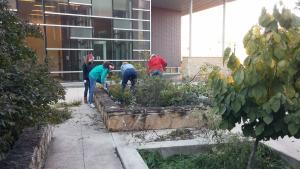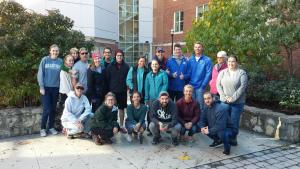

On Saturday, October 22nd, approximately 30 student volunteers representing four different student organizations joined EHS and FOD staff to clean and maintain the rain gardens behind Jennings Hall. The gardens were weeded, perennials were trimmed, trees were pruned, and shrubs and a small Ohio Buckeye tree were transplanted.
These rain gardens were among the first developed for the Columbus campus after the old Botany and Zoology building greenhouses were demolished in 1995. Rain Gardens help filter and slow the runoff from storm events and are a popular form of “green” infrastructure. Green infrastructure has gained in popularity as communities throughout the nation are addressing continued urban growth and the limitations of existing and often outdated sewer piping.
One advantage of green infrastructure is its lower maintenance requirements when compared to other forms of treatment and detention. Since 2013, these gardens have been maintained by students and student organizations interested in the environment, sustainability, and volunteerism.
Representatives from the following student organizations worked on the 22nd, under supervision of EHS and Department of Molecular Genetics representatives.
- Buckeye Stream Team.
- Engineers for a Sustainable World
- Sierra Club Student Coalition
- Society of Environmental Engineers
These representatives, and other volunteers, gathered at Jennings Hall to clean out the 22 rain garden boxes. Students removed weeds, pruned shrubs, and removed debris, to improve the aesthetics and function of the gardens.
Not only did student volunteers help beautify and maintain an important natural stormwater facility, but they also helped the university meet one of its stormwater permit requirements. These students and their efforts helped the university satisfy its “Public Involvement and Participation” Best Management Practice (BMP) required in the university’s National Pollution Discharge Elimination System (NPDES) Municipal Separate Storm Sewer System (MS4) permit.
Additional work will occur when the students return for the spring semester. Improvements will include mulching the rain garden plants, weeding, and possibly transplanting plants to further improve the rain gardens’ performance and help prevent the growth of Invasive plants. So watch for more information in the Spring!
In addition to the student volunteer and student organizations who participated with this initiative, EHS also thanks Stephen Volkmann, Emily Yoders-Horn, and FOD Landscape Services for their assistance.
